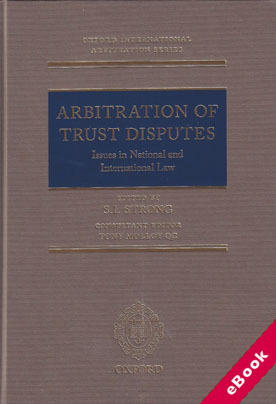
The device(s) you use to access the eBook content must be authorized with an Adobe ID before you download the product otherwise it will fail to register correctly.
For further information see https://www.wildy.com/ebook-formats
Once the order is confirmed an automated e-mail will be sent to you to allow you to download the eBook.
All eBooks are supplied firm sale and cannot be returned. If you believe there is a fault with your eBook then contact us on ebooks@wildy.com and we will help in resolving the issue. This does not affect your statutory rights.
In recent years, numerous jurisdictions have seen a significant shift in thinking about whether and to what extent matters involving the inner workings of a trust - so-called 'internal' trust disputes between settlors, trustees, and beneficiaries - are amenable to arbitration.
Not only are parties expressing an increased desire to minimize the cost and delay of hostile trust litigation, but courts and legislatures from around the world have begun to demonstrate an increased willingness to allow these sorts of disputes to go to arbitration.
Indeed, legislation allowing internal trust arbitration now exists in a number of jurisdictions, while courts in other countries have begun to allow mandatory arbitration of these types of disputes even in the absence of subject-specific statutes.
This book discusses recent and anticipated developments concerning trust arbitration in a variety of domestic and cross-border settings. In so doing, the text not only provides necessary information about the special nature of national and international trust arbitration, it also bridges the gap between trust law and arbitration law by bringing together authors with expertise in both fields.
Furthermore, this book is the first to provide detailed and critical analysis of various institutional initiatives in the area of trust arbitration (including measures proposed by the American Arbitration Association, the American College of Trust and Estate Counsel, the English Trust Law Committee, and the International Chamber of Commerce) and to offer in-depth coverage of various national, international, and comparative issues, including the applicability of the New York Convention and the Hague Trust Convention to internal trust arbitration. As a result, this book is a must-have for specialists in both trust law and arbitration law.